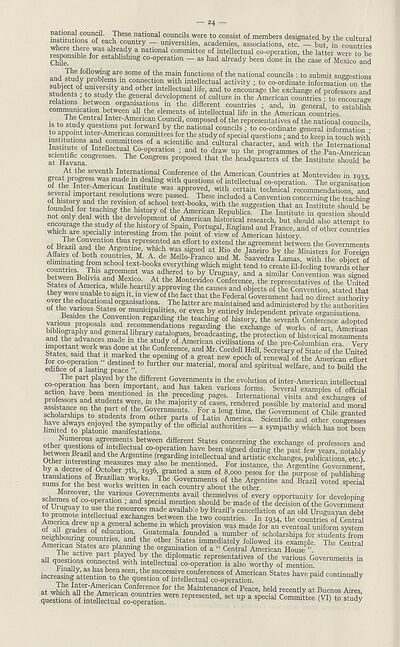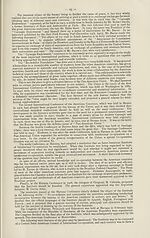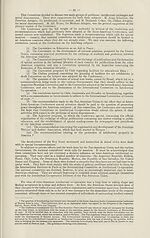International > Proceedings of the second General conference of national committees on intellectual co-operation, Paris, July 5th-9th, 1937
(26)
Download files
Complete book:
Individual page:
Thumbnail gallery: Grid view | List view

24 —
"nasttitutLCn?ofeachhcoS,mnt?v°nal C0.uncilst.were to consist of members designated by the cultural
IJrW-Ti? 1 e 1 c°untry — universities, academies, associations, etc. — but in countries
resnonsihleefWaS e kt^ E national committee of intellectual co-operation, the latter were to be
Chile W f eStabllshmg c°-operation — as had already been done in the case of Mexico and
^ Th<lfollow\ng are some of the main functions of the national councils : to submit suggestions
snbWnf problenJs m connection with intellectual activity ; to co-ordinate information the
J an<i other intellectual life, and to encourage the exchange of professors and
udents ; to study the general development of culture in the American countries ; to encourage
relations between organisations in the different countries ; and, in general, to est^bTIh
commumc^ion between all the elements of intellectual life in the American countries.
. , oe Central Inter-American Council, composed of the representatives of the national councils
to study questions put forward by the national councils ; to co-ordinate general information •
SP°-nt lnter-American committees for the study of special questions ; and to keep in touch with
nSf u01^1111^^8 °f E ®cientlfic and cultural character, and with the International
scientific conSlsse^^Thpr01561'111011 ’’ and ,to draw UP the programmes of the Pan-American
at Havana g Th CongreSS ProPosed that the headquarters of the Institute should be
At the seventh International Conference of the American Countries at Montevideo in i(m
STtP tT3^ made m dealmg witlr questions of intellectual co-operation. The organisation
of the Inter-American Institute was approved, with certain technical recommendations and
imp° resoir|tions were passed. These included a Convention concerning the teaching
foundedU^eachin^hP V° scho®1 text-books, with the suggestion that an Institute should be
lounded for teaching the history of the American Republics. The Institute in question should
not only deal with the development of American historical research, but should also attempt to
Sld°hrage the stady of the hlst°ry of Spam, Portugal, England and France, and of other countries
which are specially interesting from the point of view of American history.
nf R^?iC0n/e+ut10? thus rePresf?ted an effort to extend the agreement between the Governments
of Brazil and the Argentine, which was signed at Rio de Janeiro by the Ministers for pSekm
Affairs of both countries, M A. de Mello-Franco and M. Wdra Lamas “
eliminating from school text-books everything which might tend to create ill-feeling towards other
T 15 a8r/Tent WaSA adhered t0 by U™guay> and a similar Conventin was signed
between Bolivia and Mexico. At the Montevideo Conference, the representatives of the United
f" Ame”ca; while heartily approving the causes and objects of the Convention, stated that
)Tere uuu^1.610 Sign it, in View of the fact that the Federal Government had no direct authoritv
over the educational organisations. The latter are maintained and administered by the authorities
BelfdTthP rn63 °r,municipabtiesJ °r even by entirely independent private
. Besides Convention regarding the teaching of history, the seventh Conference adopted
various proposals and recommendations regarding the exchange of works of art American
and lt£a£?y and general.hhrary catalogues, broadcasting, the protection of historical monuments
and the advances made m the study of American civilisations of the pre-Columbian era Xv
Itetes said^haHtmarkeH ^ C°nferen“’ and Mr' <“ Hull. Secretary of State of the United
states, said that it marked the opening of a great new epoch of renewal of the American effort
edi fice °ofe aT lasting^peace6 ". * ° fUrther material- Welfare. andtobudfthl
The part pfayed by the different Governments in the evolution of inter-American intellectual
co-operation has been important, and has taken various forms. Several examples of official
"ave been mentioned in the preceding pages. International visits and exchangfs ^
assistance on^fnaTt offhe r" maJ°rlty of cas,es- rendered possible by material and moral
scholarships to students from other^arts'of LUAUericU^
it^rpS^maSaS °f " aUth0ritieS ~ 3 SymPath^ which haa ^n
ii Numerous agreements between different States concerning the exchange of professors and
other questions of intellectual co-operation have been signed during the past few years notably
Othe^frifrirestinff'rn^f^18611^1116 ^egaj;ding intellectual and artistic exchanges, pubheations, etcj!
Uther interesting measures may also be mentioned. For instance, the Argentine Government
by a decree of October 7th, 1936, granted a sum of 8,000 pesos for the purpose of publishing
translations of Brazilian works. The Governments of the Argentine and Brazil voted special
sums for the best works written in each country about the other. P
, oreover, the various Governments avail themselves of every opportunity for developing
schemes of co-operation ; and special mention should be made of the decision o/the Government
of Uruguay to use the resources made available by Brazil’s cancellation of an old Uruguayan debt
^““emfrh®65 betWe,e.\the —ies. In I934, Z countriefofTentfal
of all LadeT of Sch;mVn 'ThlCj1 Pr°v‘slon wus made for an eventual uniform system
, - ,, ^ . es °t education. Guatemala founded a number of scholarships for students from
ArlLi °UrU countrles. and the other States immediately followed its example The Central
American States are planning the organisation of a “ Central American HouTe ”
ine active part played by the diplomatic representatives of the various Governments in
all questions connected with intellectual co-operation is also worthy of mendom
-finally as has been seen, the successive conferences of American States have paid continually
increasing attention to the question of intellectual co-operation. ~ y
. , • f Iljter-American Conference for the Maintenance of Peace, held recently at Buenos Aires
questions of represented’ set up a ^ Committee (VI) to study
"nasttitutLCn?ofeachhcoS,mnt?v°nal C0.uncilst.were to consist of members designated by the cultural
IJrW-Ti? 1 e 1 c°untry — universities, academies, associations, etc. — but in countries
resnonsihleefWaS e kt^ E national committee of intellectual co-operation, the latter were to be
Chile W f eStabllshmg c°-operation — as had already been done in the case of Mexico and
^ Th<lfollow\ng are some of the main functions of the national councils : to submit suggestions
snbWnf problenJs m connection with intellectual activity ; to co-ordinate information the
J an<i other intellectual life, and to encourage the exchange of professors and
udents ; to study the general development of culture in the American countries ; to encourage
relations between organisations in the different countries ; and, in general, to est^bTIh
commumc^ion between all the elements of intellectual life in the American countries.
. , oe Central Inter-American Council, composed of the representatives of the national councils
to study questions put forward by the national councils ; to co-ordinate general information •
SP°-nt lnter-American committees for the study of special questions ; and to keep in touch with
nSf u01^1111^^8 °f E ®cientlfic and cultural character, and with the International
scientific conSlsse^^Thpr01561'111011 ’’ and ,to draw UP the programmes of the Pan-American
at Havana g Th CongreSS ProPosed that the headquarters of the Institute should be
At the seventh International Conference of the American Countries at Montevideo in i(m
STtP tT3^ made m dealmg witlr questions of intellectual co-operation. The organisation
of the Inter-American Institute was approved, with certain technical recommendations and
imp° resoir|tions were passed. These included a Convention concerning the teaching
foundedU^eachin^hP V° scho®1 text-books, with the suggestion that an Institute should be
lounded for teaching the history of the American Republics. The Institute in question should
not only deal with the development of American historical research, but should also attempt to
Sld°hrage the stady of the hlst°ry of Spam, Portugal, England and France, and of other countries
which are specially interesting from the point of view of American history.
nf R^?iC0n/e+ut10? thus rePresf?ted an effort to extend the agreement between the Governments
of Brazil and the Argentine, which was signed at Rio de Janeiro by the Ministers for pSekm
Affairs of both countries, M A. de Mello-Franco and M. Wdra Lamas “
eliminating from school text-books everything which might tend to create ill-feeling towards other
T 15 a8r/Tent WaSA adhered t0 by U™guay> and a similar Conventin was signed
between Bolivia and Mexico. At the Montevideo Conference, the representatives of the United
f" Ame”ca; while heartily approving the causes and objects of the Convention, stated that
)Tere uuu^1.610 Sign it, in View of the fact that the Federal Government had no direct authoritv
over the educational organisations. The latter are maintained and administered by the authorities
BelfdTthP rn63 °r,municipabtiesJ °r even by entirely independent private
. Besides Convention regarding the teaching of history, the seventh Conference adopted
various proposals and recommendations regarding the exchange of works of art American
and lt£a£?y and general.hhrary catalogues, broadcasting, the protection of historical monuments
and the advances made m the study of American civilisations of the pre-Columbian era Xv
Itetes said^haHtmarkeH ^ C°nferen“’ and Mr' <“ Hull. Secretary of State of the United
states, said that it marked the opening of a great new epoch of renewal of the American effort
edi fice °ofe aT lasting^peace6 ". * ° fUrther material- Welfare. andtobudfthl
The part pfayed by the different Governments in the evolution of inter-American intellectual
co-operation has been important, and has taken various forms. Several examples of official
"ave been mentioned in the preceding pages. International visits and exchangfs ^
assistance on^fnaTt offhe r" maJ°rlty of cas,es- rendered possible by material and moral
scholarships to students from other^arts'of LUAUericU^
it^rpS^maSaS °f " aUth0ritieS ~ 3 SymPath^ which haa ^n
ii Numerous agreements between different States concerning the exchange of professors and
other questions of intellectual co-operation have been signed during the past few years notably
Othe^frifrirestinff'rn^f^18611^1116 ^egaj;ding intellectual and artistic exchanges, pubheations, etcj!
Uther interesting measures may also be mentioned. For instance, the Argentine Government
by a decree of October 7th, 1936, granted a sum of 8,000 pesos for the purpose of publishing
translations of Brazilian works. The Governments of the Argentine and Brazil voted special
sums for the best works written in each country about the other. P
, oreover, the various Governments avail themselves of every opportunity for developing
schemes of co-operation ; and special mention should be made of the decision o/the Government
of Uruguay to use the resources made available by Brazil’s cancellation of an old Uruguayan debt
^““emfrh®65 betWe,e.\the —ies. In I934, Z countriefofTentfal
of all LadeT of Sch;mVn 'ThlCj1 Pr°v‘slon wus made for an eventual uniform system
, - ,, ^ . es °t education. Guatemala founded a number of scholarships for students from
ArlLi °UrU countrles. and the other States immediately followed its example The Central
American States are planning the organisation of a “ Central American HouTe ”
ine active part played by the diplomatic representatives of the various Governments in
all questions connected with intellectual co-operation is also worthy of mendom
-finally as has been seen, the successive conferences of American States have paid continually
increasing attention to the question of intellectual co-operation. ~ y
. , • f Iljter-American Conference for the Maintenance of Peace, held recently at Buenos Aires
questions of represented’ set up a ^ Committee (VI) to study
Set display mode to:
![]() Universal Viewer |
Universal Viewer | ![]() Mirador |
Large image | Transcription
Mirador |
Large image | Transcription
Images and transcriptions on this page, including medium image downloads, may be used under the Creative Commons Attribution 4.0 International Licence unless otherwise stated. ![]()
| League of Nations > International > Proceedings of the second General conference of national committees on intellectual co-operation, Paris, July 5th-9th, 1937 > (26) |
|---|
| Permanent URL | https://digital.nls.uk/195217513 |
|---|
| Shelfmark | LN.XII |
|---|
| Description | Over 1,200 documents from the non-political organs of the League of Nations that dealt with health, disarmament, economic and financial matters for the duration of the League (1919-1945). Also online are statistical bulletins, essential facts, and an overview of the League by the first Secretary General, Sir Eric Drummond. These items are part of the Official Publications collection at the National Library of Scotland. |
|---|---|
| Additional NLS resources: |
|

